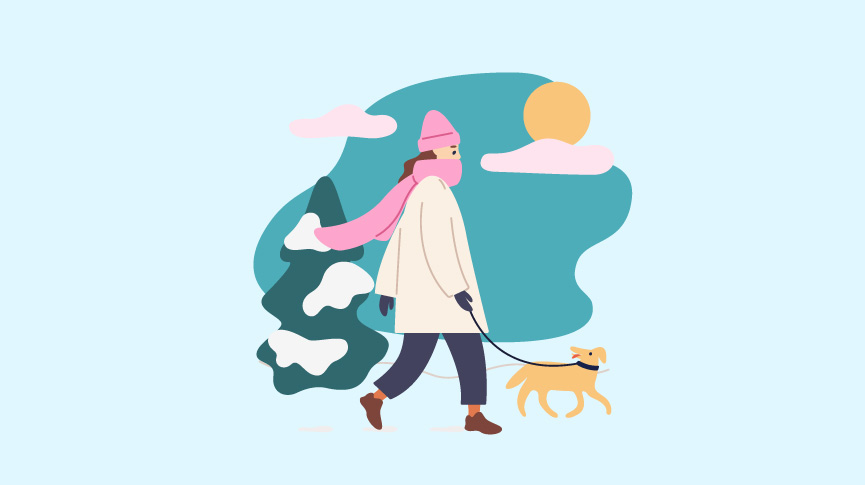Does your period get worse in winter?

As the weather begins to turn and the colder months start to set in, we adjust to the changing seasons by wrapping up warmer, switching out salads for soups and dare we say, staying in a bit more.
But do all the changes that come with winter affect our periods? And if so, is there anything we can do to make our periods more comfortable in the colder months? Here are a few aspects of wintery weather that might just be having a negative impact on your period.
Being cold affects your circulation
When it’s chilly outside, your body prioritises keeping the blood flowing to your brain, heart and other vital organs, which can be why your fingers and toes sometimes end up feeling a bit cold. As part of this process, our blood vessels become constricted, which reduces our blood flow.
Some doctors think that this constricted circulation could interfere with your menstrual blood flow and consequently increase your period pain.
Although improving your circulation might not be a fast-track method to completely eliminate all of your period paid, good blood circulation is always important to your overall health and wellbeing – and especially so in winter. One of the best ways to invigorate your circulation is exercise – so wrap up warm and head out for a walk – or if the weather’s a little too miserable – try an indoor workout like aerobics. As long as it gets your blood pumping, it will give your circulation a boost.
A less strenuous activity that can both warm you up and improve circulation is to reach for a hot water bottle or run yourself a hot bath – both of which are also tried and tested cures for period cramps.
A lack of sunshine can lead to low mood
In the summer, we are usually treated to lots of sunshine and long sunny days. When the colder months roll around, however, most of us see a pretty sudden and dramatic drop in the amount of sunlight we get. This change to darker, longer days can leave us feeling more tired and sluggish than usual – and often much more prone to low moods, as well.
But why does this happen – and what effect can it have on your period in winter? Well, Vitamin D is produced when our skin is exposed to sunlight. As well as being very important for keeping our bones, muscles and teeth healthy, a vitamin D deficiency can lead to depression, fatigue and even Seasonal Affective Disorder (SAD).
So if you’re already feeling the negative effects that PMS can have on your mental health, not getting enough vitamin D in winter could exacerbate these symptoms even more. As well as trying to get outside and make the most of any sunlight, vitamin D supplements are readily available in most pharmacies and vitamin D can also be found in a few foods like oily fish and mushrooms.
When staying in becomes the new going out
When going outside means battling with icy pavements, freezing wind and dark skies, it’s no wonder that most of us choose to stay indoors a lot more during winter. Although this is by no means a bad thing – and getting cosy inside is one of the great joys of winter – it’s important to make sure that you’re still mindful of how this can affect both your PMS and your period.
It has been found that people who are more active generally have more regular and manageable periods than people who are more sedentary. So by all means, make the most of this cosiest time of the year and indulge in Netflix and hot chocolate to your heart’s content, but try to balance this with at least 30 minutes of activity every day. Even a quick walk around the block or a spot of yoga can make a world of difference. This exercise won’t just help the physical symptoms of your period, but can also hugely improve your mental health too.
While we’re on the topic of staying in more, the winter months can sometimes lead to us snacking more than usual, partially because our bodies naturally burn more calories in the cold. Just be mindful to snack in moderation, and if you feel yourself indulging in a bit more PMS-related comfort eating than you’re happy with, try cutting down on some of these known period-aggravating ingredients:
- Salt: lots of salt can lead to water retention and worsen bloating
- Sugar: too much of it can cause energy crashes and worsen moods
- Coffee: it can cause water retention and bloating if too much is consumed
- Alcohol: can lead to dehydration, headaches, nausea, fatigue, vomiting and more
Getting your period in the winter months is not all sunshine and roses – literally. Although the cold temperature, lack of sunlight and overall lifestyle can be detrimental to both your PMS and your period, with some of these simple tips and swaps, you should be back to enjoying the most wonderful time of the year in no time.

Natasha (she/her) is a full-spectrum doula and health+wellness copywriter. Her work focuses on deconstructing the shame, stigma, and barriers people carry around birth, sex, health, and beyond, to help people navigate through their lives with more education and empowerment. You can connect with Natasha on IG @natasha.s.weiss.


